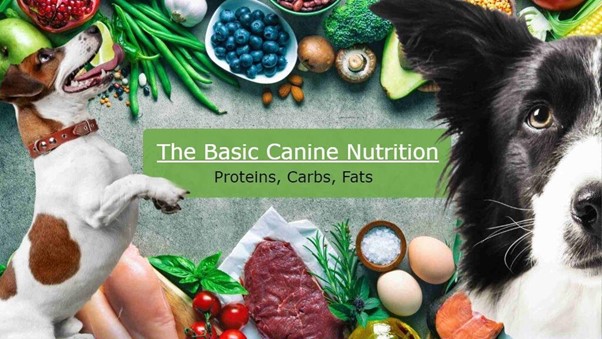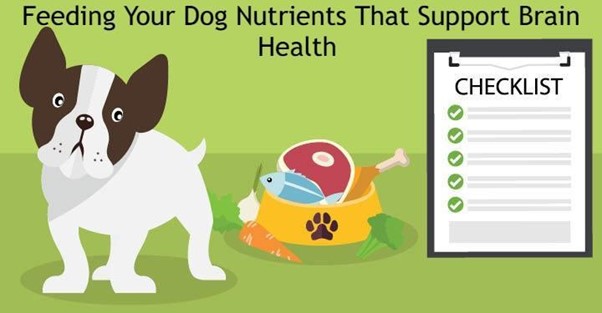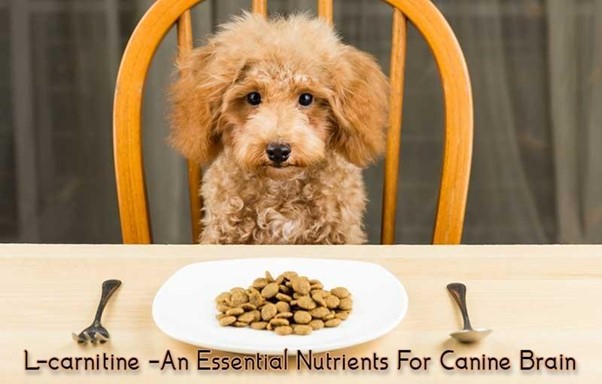Nourishing Your Dog’s Mind: A Nutritional Guide for Cognitive Health
- Last updated on February 2, 2023
- By: Caroline Stowe
Have you ever noticed that your dog is a little forgetful? That it takes them longer to catch onto your commands compared to other dogs?
We all love our dogs and want the best for them. Just like with humans, feeding your dog a healthy balanced diet is essential to keeping their minds sharp and alert.
A diet packed with quality ingredients and vitamins can have a positive impact on your pup’s cognitive abilities. This guide will help you improve your furry friend’s brainpower in no time.
So, if you’re looking to give your pup an extra boost of brain power, and want to create a diet that will keep your furry friend thinking, learning, and growing, here are some tips on how to nourish your dog’s mind through nutrition.
How To Unlock Your Dog's Brain Power? Start with Nutrition!

Just like with humans, a balanced diet is key for dogs as well. Make sure your pup’s meals are made up of quality proteins, carbohydrates, fats, and minerals.
If you’re unsure about what type of food to give your pup, talk to your vet or do some research into which are the best dog food brands on the market.
You should also consider adding vitamins and supplements to their diet if they need an extra boost of vitamins or minerals.
Basic Canine Nutrition
First, let’s look at the basics of canine nutrition. Dogs are omnivores and require a balanced diet of protein, carbohydrates, fats, minerals, vitamins, and water.
The source of these nutrients can come from either commercial dog foods or home-cooked meals.
It’s important to understand what types of food are beneficial for both health and cognitive development before making any dietary changes.

Protein
Protein is essential for maintaining healthy muscle mass and providing energy for daily activities.
Protein plays an important role in neural development as well as muscle growth—both of which are extremely important for our pet friends!
Protein helps keep their brains functioning optimally while also giving them the energy they need to stay active and alert throughout the day.
Common sources include chicken, beef, fish, eggs, and dairy products such as yogurt or cheese.
You can also get protein from eggs and cottage cheese — two delicious options that your pup is sure to love!
Check out our recommended list of best high protein dog foods here.
Carbohydrates
Carbohydrates provide an additional source of energy and fiber to support digestion. Whole grains such as oats or rice are good sources of complex carbohydrates while fruits like apples or bananas contain simple carbohydrates that provide quick bursts of energy.
Fats
Fats are another important component in a well-rounded diet as they provide essential fatty acids that help keep the skin healthy and coat shiny.
Good sources of fat include fish oil supplements or natural fats found in meats like chicken or beef.
Feeding Your Dog Nutrients That Support Brain Health
In addition to the basic macronutrients, also consider adding supplements to your dog’s diet.
Feeding them brain-boosting nutrients such as omega-3 fatty acids, antioxidants, vitamins B12 and E, and minerals such as copper, iron, and zinc will provide them with essential elements for better memory and focus.

Eating the right foods like omega-3 fatty acids (fish oil), L-carnitine (amino acid), antioxidants (vitamins C & E), probiotics (live bacteria cultures), green tea extract (antioxidants), and coconut oil (fatty acids) will help enhance your dog’s cognitive function.
Antioxidants
Antioxidants are another key player when it comes to promoting healthy brain functioning in dogs.
Antioxidants have been proven to protect cells from damage caused by free radicals which can lead to certain diseases of the brain such as Alzheimer’s disease in humans.
Dogs require antioxidants too! Foods such as blueberries and broccoli contain plenty of antioxidants that help protect against damage caused by oxidative stress on the brain.
In addition to providing your pup with antioxidant-rich snacks like blueberries, you can also buy antioxidant supplements that come in powder form that you can sprinkle over their food or add to treats to make sure they get an adequate dose of these powerful compounds without having to worry about portion control!
Vitamins B12 & Vitamin E
Vitamin B12 plays an important role in nerve cell metabolism which helps ensure optimal memory performance while vitamin E helps protect the cells from oxidative damage associated with aging processes in the brain
Both these vitamins are essential for keeping your pup sharp mentally.
Some good sources of vitamin B12 include liver, eggs, and fish oil supplements; Vitamin E sources include wheat germ oil and vegetable oils (e.g., sunflower).
You may also want to consider adding a multivitamin supplement that contains both vitamins B12 & E along with other essential nutrients for optimal brain health into their daily routine if your pup doesn’t eat enough of these foods naturally in order to get sufficient amounts each day!
L-carnitine
L-carnitine is an essential amino acid that has been found to have numerous health benefits for your dog’s body and mind.
Supplementing their diet with L-carnitine can not only increase their energy levels but also enhance cognitive abilities, giving your pup the mental edge they need.
L-carnitine helps increase oxygen delivery in the body and encourages the production of acetylcholine, which is a neurotransmitter that plays a critical role in learning and memory.

As such, adding these supplements to your four-legged pal’s diet can help maintain and enhance their mental performance, as well as reduce mental fatigue after strenuous mental activities.
Not only that, L-carnitine provides a natural antioxidant defense that can help protect your pup from free radical damage particularly caused by aging. Keep your fur baby healthy mentally and physically with this little wonder – L-Carnitine!
One of the best sources of L-Carnitine is red meat, such as beef and lamb. These meats are naturally high in L-Carnitine, but the amounts can vary depending on the cut and type of meat.
Omega-3 Fatty Acids
When it comes to boosting your pup’s intelligence, one of the most important components is fatty acids. Omega-3 fatty acids have been linked to improved brain development and better memory in humans and animals alike.
Studies have shown that these fatty acids help regulate mood, reduce inflammation, and improve overall cognitive abilities in our furry friends.
It promotes brain health since it aids in cell membrane health by improving nerve cell membrane fluidity which helps support clear thinking.
They help promote healthy skin and coats too! Look for foods that contain fish oil or flaxseed oil as these both contain Omega-3 fatty acids.
Fish oil is especially beneficial because it contains both EPA and DHA which are two omega-3 fatty acids most commonly found in pet food ingredients.
Check out our recommended list of omega 3 for dogs here.
Make sure to check with your vet before giving your pet any supplements though – they will be able to advise on the right dosage for them.
Green Tea Extract
Green tea extract contains powerful antioxidants known as catechins that can reduce inflammation while coconut oil provides medium-chain triglycerides that can be used as an alternative fuel source for the brain.
All these supplements will not only improve your pup’s overall health but will also boost their cognitive ability over time if included in their regular diet!
Go Natural
It’s important to make sure your pup is getting enough natural ingredients in its diet as well.

Natural ingredients such as fruits and vegetables provide essential vitamins, minerals, and antioxidants that keep them healthy from the inside out.
Check labels when buying pet food – if it has a lot of artificial flavors or preservatives then it may not be the best option for your pup’s health (or yours!).
Additionally, try feeding them some fresh fruit or vegetables every now and then for added benefits!
Conclusion
A nutritious and healthy diet is key when it comes to boosting your pup’s physical as well as mental health!
Feeding your pup the right foods will help improve their cognitive abilities and keep them thinking clearly into old age.
Start by introducing more proteins into their meals such as chicken or fish along with complex carbs like whole grains or fruits for energy throughout the day!
Additionally, adding supplements like omega-3 fatty acids, L-carnitine and green tea extract can also help improve your pup’s cognition over time so don’t forget about those either!
With this guide in hand, you’ll have all the tools necessary to start enhancing your dog’s mental capabilities! So get out there and start feeding smarter! Your pup will thank you later!
Other than giving your furry pal a healthy diet for brain development, play some games with your dog that enables it to improve its brain functions.
Watch the video below as Dr. Gary Ritchter provides valuable insights on how to promote mental stimulation in dogs.
-
Author: Caroline Stowe
- Updated on February 2, 2023
Disclaimer: This article doesn’t intend to replace professional veterinary advice, nor should it be used as a substitute for veterinary services, diagnosis, or treatment. The content on this website, including information and opinions expressed herein, are intended for general informational purposes only. In case you have concerns or questions regarding your dog’s health and diet requirements, please consult your veterinarian before doing anything that might affect it.
DogPetGuide.com and the writer are not responsible or liable for any damage, liability, costs, or claims arising from any possible consequences of the reader’s action after reading this article.




